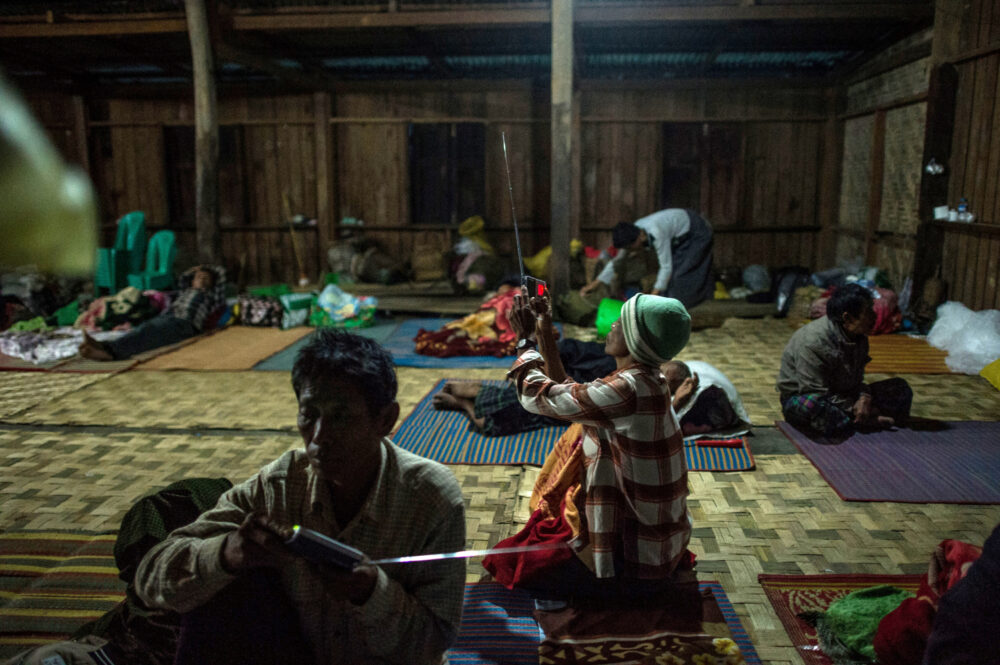Zar Ni, is a reporter for Doh Athan “Our Voices”, weekly 10-minute podcast produced and broadcast by Fondation Hirondelle and Frontier Myanmar that covers human rights issues in Myanmar. After the coup in 2021, the team had to leave the country and now operates from Thailand. This interview is taken from the 13th issue of Mediation, entitled ‘Structuring exiled journalism in a more authoritarian world’, which you can find here.
Doh Athan was initially produced in the country, why did you have to leave?
Zar Ni: The turning point was the coup in February 2021. At the time, I was already working as a reporter for Doh Athan “Our Voices”. Brutality struck the nearby media companies. Officers arrested, and even raided, those who worked at some of these institutions. This coup came with its own challenges as well. My family was neighbour with a military family and the school across the street was filled with soldiers. I could no longer work at home, and for several months I worked at night, holed up in my father’s office. The situation became increasingly difficult. By continuing my work as a reporter, I was putting myself and my family at risk. I’ve had to go into exile in Thailand with the rest of the staff, like the vast majority of Burmese journalists. Most fled after the 2021 coup.
You’ve been away from your family for two years now. What drives you to continue working as a journalist despite the sacrifices?
After the 2021 coup, most of my friends were fighting for democracy. At that time, I was wondering if journalism was still supporting the country. One of my colleagues younger than me, not from the journalism field, asked me for an interview before my departure. At that time, I answered him like this, “I don’t want to work as a journalist any more. Are my stories effective for the country or not?” He said “Sister, you are doing a great job, you are writing history.” When I heard that, I thought I need to stay as a journalist, write history, make sure it’s accurate, not biased. Whenever we produce a story it will be accurate and not biased and we will record history clearly. Starting from that time, I mainly concentrate on being an independent journalist, focusing on the people.
What are the main challenges reporting from outside?
A challenge of working in exile is trust. Initially, I relied mainly on my personal contacts. As time goes by, however, my contacts move away or become increasingly afraid to talk. Also, I sometimes have to hide my profession so as not to endanger my family. Today, working for Doh Athan is a definite advantage. The broadcast has won the ‘Human Rights Press Award’ which inspires confidence. Word of mouth allows us to maintain contact with the local population, including the most vulnerable such as the Rohingyas. We do the best we can, but we can’t work the way we used to before the coup, that’s obvious.
People in Myanmar mainly use Facebook for their information, although YouTube, Telegram and radio stations exist as alternatives. Doh Athan has around 120,000 Facebook followers. People also listen to our show on Voice of America, which broadcasts to millions of listeners across the country. According to the demographics from Facebook, younger people from the city typically follow the podcast.
How do you ensure financial viability and sustainability?
Media in exile depend on external funding. Unfortunately, this funding is dwindling as Myanmar is slowly becoming a forgotten crisis and the role of media in conflict prevention is not taken seriously. Doh Athan is unique in its productions. Where other news outlets tell the story of political developments, Doh Athan promotes the stories of ordinary people and the human rights violations that are worsening each year. Programmes like ours can ensure local people express their opinions and receive information from reliable sources.

